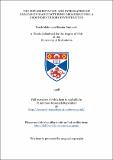The implementation and integration of CAD/CAM in manufacturing organisations: a grounded theory investigation
Abstract
New technology has received increased attention in the literature over the past two decades. Information technology's profound economic, social, political, organisational, and psychological effects have been the subject matter of numerous studies. The wide-spread use of computers in manufacturing industry is an important area for research into what may look superficially as a purely technical change but turns out to be, in effect, as much about organisational adaptation as it is about the introduction of a technology system per se. The latter needs to fit the host organisational setting in order to operate and deliver and the former needs to fit the technology being introduced in order to make an effective use of it. Among other important computer technology applications in manufacturing industry (e.g. robotics, CAT and MRP-I), CAD was the subject matter of numerous research efforts during the 1970s and 80s. So was CAM but to a lesser degree. For the 1990s and beyond, however, the focus of research has shifted to concentrate on integrating technologies (e.g. MRP-II and CADCAM) used in manufacturing companies and often symbolised by the generic concept of CIM. Such technologies are more technically advanced in their own right but they also have greater implications for job design and work organisation. This thesis addresses the gap between precept and practice in CADCAM implementation as a technology-induced organisational integration process. The aim of the present research is to develop a better empirically-informed understanding of integration as an organisational change process by researching and comparing ten selected UK-based manufacturing companies' experiences. The emphasis in this study is on the discovery and development, rather than testing, of theory. Therefore, the underlying theory here is grounded in the data gathered through an oriented field research, rather than tested for verification purposes following a logic-deductive literature review. A qualitative, "grounded theory" methodological approach is used to meet the set objective on the basis of a defined link between the study's theoretical and methodological frameworks. The research strategy is designed to include a longitudinal case study approach which traces the companies' historical experiences of introducing CAD and CAM systems since the early 1970s (in the ten companies) and current experiences of interfacing them to create integrated CADCAM (in five of them - termed primary cases), as well as the lack of integration initiatives (in the other five companies - termed secondary cases). Seven tentative research questions are used to orient the field research initially. A conceptual model is then developed as a framework for the generation of theory: 20 substantive theoretical propositions on CAD/CAM and integration and, subsequently, 20 corresponding formal theoretical propositions on organisational change in general, of which 14 are presented in a hypothesis form. The findings have implications for directing the efforts of future organisational change, particularly in the area of CADCAM integration. They should be of interest to different individuals and groups who are involved in organisational change in one way or another. Senior and technical managers in particular may find them to be of importance in managing the organisational aspects of a strategic technological change process.
Type
Thesis, PhD Doctor of Philosophy
Collections
Items in the St Andrews Research Repository are protected by copyright, with all rights reserved, unless otherwise indicated.

